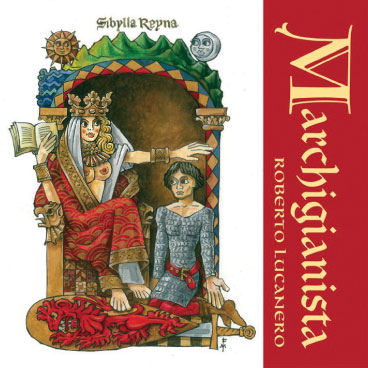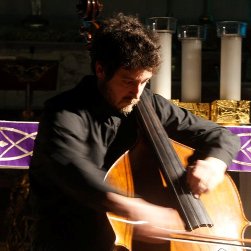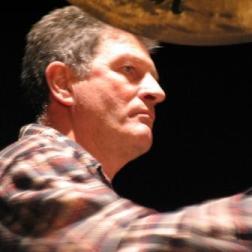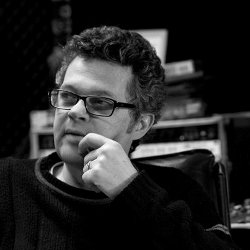Marchigianista: an album and a manifesto
“Marca, Marche, Marchigiano, Marchigianesco, … Marchigianista!
That’s enough of fusion: it’s time for musical cannibalism.”
São Paulo, Brazil, May 1st 1928, year 374 from the “swallowing” of Bishop Sardinha: Oswald de Andrade publishes his “Cannibal Manifesto”
in theRevista de Antropofagia from this the Brazilian Tropicalist musical-cultural movement was subsequently born and developed..
Porto Recanati, Marche, central Italy, October 18th 2011, Saint Luke the Evangelist’s Day, I decide to publish an album of mine on the web;
in honour of that poetic manifesto and that movement it’s entitled, … Marchigianista!
Read more »
As a matter of fact, Marchigianista is not just the title of an album. Marchigianista is in turn a poetic manifesto, a cultural project, a life philosophy, it is, if not a musical movement, a musical group that gets you moving!
“Gaiety is the litmus test”, as Andrade states more than once in the “Cannibal Manifesto”. Cultural cannibalism is the basis of Marchigianista: and specifically musical cannibalism, not vile “fusion”.
Contaminating literally means polluting, dirtying, dishonouring. Contamination creates a chaotic reality seeing as the contaminant and what gets contaminated stay messily separate.
Instead, eating means feeding on what you eat, it means incorporating, digesting, absorbing, metabolizing. Eating gives vigour and strength, it creates order and life.
Ritually eating the enemy, the other, allows you to absorb and retain their strength, their qualities; in this way the Taboo transforms itself into a Totem, once and for all.
Although it is very far from us in terms of the time, space and cultural assumptions it arose from, Brazilian Modernism can still provide us with some vital stimuli.
The traditional culture of the Marche region is marginal compared to the dominant mass culture (what’s popular on television) but also compared to the traditional cultures of other areas of Italy that have become key in recent decades, thanks to effective revival operations in various sectors (the revival of the traditional music of Salento is exemplary).
With the Marchigianista project I have tried to follow in the footsteps of the Brazilian intellectuals of the last century to create music that would remain essentially “from the Marche”, firmly attached to its roots, yet at the same time would become universal, understandable anywhere and “exportable”.
To do this first of all I put the focus back on the traditional culture of my land, the Marche, which in the collective imagination is often little more than a “non-place”.
I began from the knowledge of the traditional culture of the Marche and, where necessary, from the reconstruction and revitalisation of that culture; at the same time I worked in such a way that this traditional culture, once it had regenerated itself, would gain even more strength from cultural and musical stimuli which are very different and often distant.
I started by exploring the past/present time axis within the region in order to choose the material to work on: traditional songs and dances, compositions of my own inspired by traditional music or pieces of music found in manuscripts from the past, popular lyrics or material by songwriters, myths, legends, little-known historical events that occurred in the Marche region.
I then explored the internal/external spatial axis in order to create arrangements and improvised work based on traditional music of the Marche but also drawing on other sources, international ones: progressive rock, jazz rock, the French and Anglo-American folk revival, Latin-American music.
The choice of musical instruments used followed the same guidelines as the repertoire and arrangements, combining traditional and modern, acoustic and electric. My ‘bellows’ (piano accordion and diatonic accordion) and my voice fan the flames of the fire at the heart of Marchigianista and revolving around this there is Francesco Tesei’s folk guitar, electric guitar and double bass,
Leandro Scocco’s electric bass and the drums played by Mauro Mencaroni (much-loved drummer with Agorà, the jazz rock band from the Marche that became well-known and internationally popular in the 1970s).
The poetic foundations and musical voraciousness of Marchigianista can be found, therefore, in the writings of Oswald de Andrade. Some excellent interpretative keys are certain statements made by this Brazilian intellectual:
“work against naturalist detail – in favour of synthesis; against romantic morbidity – in favour of geometric balance and technical results; against copying, in favour of invention and the surprising”
( from the “Manifesto of Pau-Brasil Poetry”); “Gaiety is the litmus test. […] Against Memory as the source of custom. Renewed personal experience” (from the “Cannibal Manifesto”).










